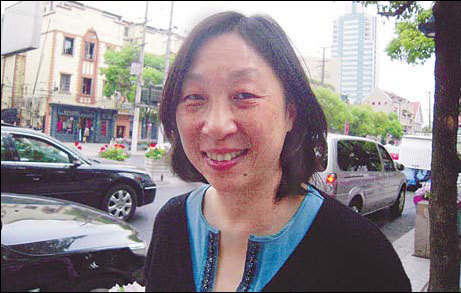 |
|
Shanghai writer Chen Danyan says that some of the changes the city is witnessing are robbing it of its unique identity. Chitralekha Basu / China Daily |
Her main agenda is to capture the changing attitudes and outlooks of the city's people, as "it's the people that in essence represent this change".
The paradox about Shanghai, Wang says, is that the city seems to be getting younger by the day, though not necessarily prettier.
The extraordinary and worldwide popularity of the novels of longing and deception by Eileen Chang, played out against the backdrop of corruption and intrigue in the wake of Sino-Japanese hostilities in 1930s Shanghai is a major reason for the reading public's fascination with that era.
"But Eileen Chang was essentially paying attention to the capitalists, the affluent classes, the higher echelons of society," says Wang Xiaoying. "It was about the dazzling exhibition of wealth, the struggle between invaders and the capitalists. But my focus is on the ordinary civilians, living in shikumen houses." Hence her novel is about Shanghai's vicissitudes as seen from the point of view of ordinary people, about how they cope with development and changing class equations.
Chen Danyan, who began as a best-selling author of teen fiction and then graduated to writing exhaustively researched historical novels and non-fiction for mature readers, laments that some of the changes Shanghai is witnessing are robbing it of its unique identity. "I feel sad about the passing away of Shanghainese dialect and cultural practices," she says.
In Shanghai Princess (2000), based on the true story of an Australian-Chinese woman's journey across more than 80 years of Shanghai's history, from 1917 to 1998, Chen had ample scope for documenting old-world vocabulary and traditions. But given the pace at which Shanghai seems to be morphing, "it's difficult to tell the past from the present, a European from an authentic Chinese, when both might be dressed identically and speaking the same lingo", Chen says.
She presents another reading of contemporary Shanghai in her forthcoming novel, which follows the tumultuous and dramatic history of the Cathay (now Peace) Hotel, from 1929 to the present. "Shanghai is almost like a human being. It has its own life and thought, its own erratic behavior, failures and shortcomings," says Chen. "I can only attempt to clarify, explain and reflect on the way it is. I don't even like it in certain respects but it is not my place to change anything. I want to read and understand Shanghai for myself, not just imagine it."
Sun Ganlu, whose genre-defying experimental leaps into fantasy were hailed as representative avant-garde writing in the 1980s, now writes mostly in the realistic mode. Nothing to Do Today, the title of a collection of his essays on Shanghai culture, including reviews of books and films, published in 2009, is particularly prescient. It is inspired by French emperor Louis XVI's diary entry on what seemed a placid morning on July 14, 1789. Within a few hours the Bastille was stormed and the French Revolution had begun. "Sometimes we are limited in understanding contemporary realities and the momentous events happening in our own time and close at hand often elude us," says Sun. "The writing about Shanghai today might be similar, maybe we are unable to see the stories of real import."
For one who has written extensively and in myriad forms on Shanghai's history and cultural heritage, including scripting for a TV series in which he put provocative questions to some of Shanghai's prominent authors, Sun remains somewhat under-whelmed by the city's phenomenal commercial progress. "If the figures are to be believed there must be growth and business. But I am more concerned with people's lives, the hardships, the complexities and the city's impact on the individual," he says. "I would like to question the nature of these difficulties and the cost at which we are earning our time and life in this city."


